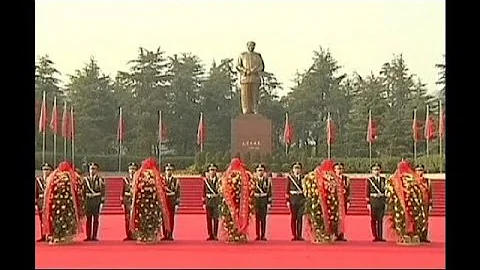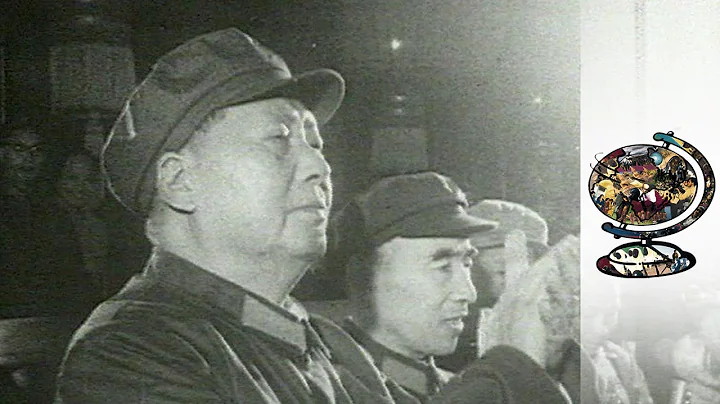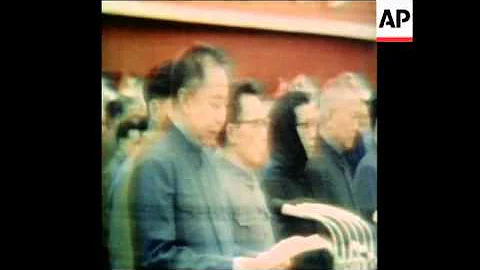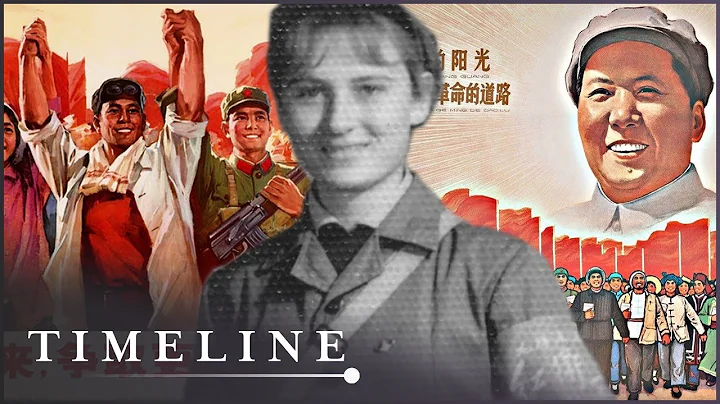On August 7, 1952, in Zhongnanhai, Beijing, Chairman Mao was pacing back and forth in his office, as if thinking about something. Suddenly, he stopped in front of the window, asked his secretary to bring him a pen, and said solemnly: "I must write Gong Weirong's appointment letter myself."
I saw several lines of large characters appearing on the appointment letter, which read:
"The 17th meeting of the Central People's Government Committee hereby approves the appointment of Gong Weirong as a member of the Anhui Provincial People's Government ..."
Finally, Chairman Mao signed his name.

We can’t help but wonder, who is this person named Gong Weirong? Why did Chairman Mao personally write the letter of appointment to her?
Gong Weirong was born in the Gong family in Hefei. The Gong family is the head of the four prominent families in Hefei (Gong, Zhang, Li and Duan). opened "Hundred Influential Women in Hefei for a Century ", and 7 of the Gong family were selected, including Gong Weirong.
As the daughter of the Gong family, Gong Weirong not only has a beautiful appearance and a kind heart, she also has superb medical skills to save lives and heal the wounded.
She is the pride of "Hefei Gong" and the pride of Hefei people.
A daughter of the Gong family grew up, and she vowed not to return until she studied medicine.
On October 9, 1900, Gong Weirong was born in Hefei. In the early years of the Republic of China, Gong Jibing, a native of Hefei, served as director of the Department of Finance, Director of the Department of Internal Affairs and Acting Chief of Civil Affairs in Shandong. His cousin Gong Jiyi served as the director of the Military Law Department of Shandong and the county magistrate of Rizhao and Pingdu counties.
When he was 13 years old, Gong Weirong followed his mother to Jinan and met his father Gong Jiyi, so the family was able to live together.
Shortly after arriving in Jinan, Gong Weirong attended Jinan Women's Normal School. Although she was born into an official family, she has been influenced by new culture and new concepts since she was a child. Therefore, Gong Weirong is open-minded and yearns for democracy and freedom.
At that time, Gong Weirong and many young people believed that only by taking the road of scientific salvation could we get rid of the country's current situation. For this reason, she passed the Shandong Women's Medical School and began to receive rigorous systematic training in medical theory and practice.
In the spring of 1919, Gong Weirong heard that at the Paris Peace Conference, the imperialist countries unreasonably rejected China's legitimate demands, and that they also wanted to hand over the defeated country's privileges in Shandong to the Japanese. This made the entire Jinan academic community boil.

At that time, aspiring young people across the country stood up. On May 4th, they organized a massive patriotic and anti-imperialist parade, which was the "May Fourth Movement."
As a progressive student and a Chinese with integrity, Gong Weirong hates foreign powers for bullying China and bullying the Chinese people. Therefore, she was filled with righteous indignation, resisted the pressure brought by her family, and resolutely joined the ranks of the student movement.
In the end, the result of this struggle forced the Beijing government to order the removal of Cao Rulin and other three traitors from their posts. They did not recognize the " Twenty-one Articles " that had lost power and humiliated the country, and refused to sign at the Paris Peace Conference.
The outbreak of the May 4th Movement made Gong Weirong even more determined. She must study medicine and use her medical skills to serve the society and the people in the future.
You must know that studying medicine is not an easy task. In the old society, there were very few women studying medicine. They were rare. But Gong Weirong didn't care about this. She was determined and determined to create a new world. New world.
However, not long after she entered the fourth grade, a marriage found her.
At that time, the Xiang family from Yuantuanji, Beixiang, Hefei came to Jinan with their 18-year-old son for the purpose of picking up the bride.
The name of the child of the Xiang family is Xiang Yiding. There is another story about the marriage between him and Gong Weirong!
It is said that at that time, the parents of both parties were arguing with each other in the opium den and appointed Xiang Yiding of the Xiang family and Gong Weirong of the Gong family to form a "baby marriage". At that time, there was a popular saying in Hefei that "a female junior will hold a gold brick", so As a result, Gong Weirong, who was three years old in Xiang Yiding, naturally became a good "daughter-in-law" of the Xiang family.

Gong Weirong saw this "fiancé" whom she had not seen for more than ten years coming to find her. She obeyed her parents' arrangements, did not object to the marriage, and agreed to marry Xiang Yiding.
However, Gong Weirong had her own requirements. She didn't want to go back immediately. She had to wait until she finished her studies and studied medicine well before going back. Even when she said this, her tone was very firm.
In this way, their marriage was held in Jinan, the wedding room was located in the Gong Mansion, and Xiang Yiding also stayed in the Gong family in Jinan to "accompany him". The next year, Gong Weirong had her first child, but this did not affect her studies at all. She left her children to be raised by her family while she plunged into the ocean of knowledge.
With tenacious perseverance and perseverance, Gong Weirong's 7 years of hard study in school finally came to an end. In 1925, Gong Weirong received her university diploma and she also accumulated a certain amount of medical knowledge.
At this time, her second son was born, named Xiang Youbin.
The hospital is gone, but it can be rebuilt. I just want to continue to practice medicine.
In 1928, the "May 3rd" tragedy occurred in Jinan, Shandong Province, which shocked the whole country. In just a few days, more than 3,000 Chinese soldiers and civilians were killed. Among them, Including Cai Gongshi and other 17 Chinese diplomats.
The atrocities committed by the Japanese invaders completely aroused public indignation among people from all walks of life in Jinan. Gong Weirong, who was working as a substitute teacher for a female teacher in Jinan at the time, went to the government to petition the government together with teachers and students. She and the students and teachers lived on the streets, insisting that the invaders withdraw from Jinan.
Seeing countless families being persecuted and the streets filled with people's cries and shouts, Gong Weirong shed tears. You know, what a strong woman she is! But faced with such a situation, any flesh-and-blood Chinese would shed tears.
However, tears did not bring Gong Weirong down. She wrote slogans and sold them on the street for charity, and then donated the proceeds to the relatives of the victims to help them get out of trouble.
This struggle lasted for several months. Gong Weirong and the people of Jinan stayed together and shared the difficulties until the following year when the Japanese troops were forced to withdraw from Jinan.

In 1929, Gong Weirong moved back to Siwan in Hefei from Jinan, and then came to the countryside of Yuantuan, 60 miles away from Hefei. What is unexpected is that a series of changes happened next to Gong Weirong, which changed her life greatly.
First, her husband became addicted to cigarettes and spent money like water. Then Gong Weirong's mother died of illness and her father was discharged and returned to work. The most serious thing is that the Xiang family has offended people for some reason and is targeted everywhere.
After a series of accidents, Gong Weirong returned to her parents' home, but she couldn't stay there anymore, so she had to start selling the jewelry she had given as a dowry in exchange for some living expenses to make ends meet.
But is this kind of life really what Gong Weirong wants? No, she is a strong woman with a dream of medicine. She also wants to save lives and heal the wounded, use her professional knowledge to help more people get rid of the pain caused by the disease and serve the society.
With the support of this strong desire, Gong Weirong dragged her two children to live in Hefei Christ Hospital and became an intern.
This hospital is a missionary hospital and uses English. Gong Weirong studied German medical textbooks in Jinan in his early days. In order to facilitate communication at work, she visited outpatient clinics, checked wards, and went to the operating room during the day, while at night she tutored in English and took care of her children, leaving no free time at all.

During the internship, there was no salary. Gong Weirong could only continue to live by selling some jewelry from her dowry. Sometimes, her husband would come and make a noise, even overturning the table, asking her to go back to the countryside. Gong Weirong, on the other hand, endured tears and strived for independence, allowing her two children to study in the city. It was not until she was promoted to a resident doctor in the second year that she earned a monthly salary of ten yuan.
Due to Gong Weirong's solid medical knowledge, dedication and hard work, she gradually changed from a resident physician to an attending physician, and her salary was also increased from the original 10 yuan to 50 yuan, so she had no worries about food and clothing for the time being.
In 1937, after the Marco Polo Bridge Incident, the war spread rapidly to Anhui. Beginning in October, Hefei was frequently bombed by Japanese aircraft, and even Christ Hospital was not spared.
On May 14 of the following year, Hefei fell and Xiang Yiding was killed by the enemy. At that time, the Japanese invaders burned, killed, and looted in Hefei. They committed all kinds of evil and caused great harm to the Chinese people.
On the eve of the Pacific War, the Japanese invaders became more and more unscrupulous. They frequently provoked countries such as Britain, the United States, and the Netherlands. Co Puren, the American director of Hefei Christian Hospital, decided that the hospital would be temporarily disbanded and the foreigners would return to their home countries. Before leaving, Ke Puren issued medical experience and qualification certificates to each Chinese employee.

Picture | Hefei Christ Hospital
Under such circumstances, Gong Weirong did not live in peace. She first sent her two children to the rear to study, and then she took the medicine and equipment assigned to her by the hospital and rushed to the hospital with several medical staff. After passing through the occupied areas, we walked 500 miles to Lihuang County, the temporary capital of Anhui Province, where we opened the Lihuang temporary clinic of Hefei Christian Hospital and restarted the work of saving patients and treating people.
But just when the clinic's business was booming, in January 1943, the Japanese army raided the Dabie Mountains and burned Lihuang County. Gong Weirong was still outside at that time. When she came back, she was faced with another mess. At this time, she had become a "refugee" who had a home and could not return, and had nothing.
But Gong Weirong was stubborn by nature, so she raised her head again and decided to start from scratch. At that time, she lived in the corridor of the patient's home and went out to practice medicine during the day. She often had to walk more than 10 miles of mountain roads. Her feet were worn out and swollen, but she did not complain about the pain.
Gradually, Gong Weirong's medical skills and medical ethics were well publicized in the local area. There were more and more thank you notices in newspapers, and her income increased. She built a clinic there again and returned to the busy scene of the past.
In the provincial capital during the war, many people came to see Gong Weirong for medical treatment, including not only dignitaries but also ordinary people who came here to see him. Every time he met poor people who had no money for medical treatment, Gong Weirong would extend his hands to help.
When the country was in trouble, Gong Weirong stood up and performed her duties as a doctor. She worked tenaciously and kept moving forward with tenacious dedication.
A bright future, selfless dedication, Chairman Mao personally wrote the appointment letter
If Gong Weirong struggled in the first half of her life and tasted all the flavors of the world, then the second half of her life was to welcome the light and let her children grow up in the world. Pursue progress amidst the waves.
In the winter of 1948, Gong Weirong's son Xiang Youbin returned to his hometown in Hefei from Nanjing with his fiancée Dong Shanhan. Gong Weirong's face was full of smiles. She fervently hoped that her son could stay with her and welcome the light together. But that night, Xiang Youbin made other requests.

Picture | Xiang Youbin
Xiang Youbin said to his mother: "I want to go to Shandong to participate in the revolution. Please agree."
Hearing this, Gong Weirong was silent. She slowly raised her head, smiled and said: Go, the man is ambitious." Then, he endured the pain of separation and packed his luggage for his son.
On the day of departure, Gong Weirong watched his son walking into the distance on the white snow, while he stayed alone in Hefei.
After the founding of New China, Xiang Youbin was transferred from Shandong via Shanghai to work at Wanbei Daily. Gong Weirong suddenly seemed to be 10 years younger. She spread her brows and said happily: "I have never seen anyone who looks like a Communist Party cadre." Such hard work, simplicity, and honest service to the public. Now the country is under construction, let's all work together!"
At this time, Gong Weirong was already 50 years old, and she was still active at work, doing outpatient clinics in the morning, checking wards in the afternoon, and sometimes having surgery. I won't be back until very late.
In her medical practice, she once removed an ovarian mass weighing more than 30 kilograms from women, and also allowed some patients with cataracts to regain their sight. These were considered major surgeries in Hefei Hospital during the liberation period.
In addition, Gong Weirong also actively responded to the call of the Provincial Women's Federation and mobilized hospital employees to donate money and materials to support the war to resist U.S. aggression and aid Korea. She also often attends various meetings and does a good job in women's work.
Due to Gong Weirong's firm stance and enthusiasm for her work, she was soon appointed as the vice president and director of surgery of the Provincial Peace Hospital.
In 1952, Gong Weirong was not only elected as the provincial people's representative and the representative of the All-China Women's Federation, but was also personally appointed by Chairman Mao as the first committee member of Anhui Province, which is the scene mentioned at the beginning of the article.

Picture | Chairman Mao
Winning so many honors did not make Gong Weirong complacent. She felt that the responsibility was even greater. She said: "In my past work, I was only responsible for myself and my patients. Now I am also responsible for the party and the government. I not only have to do a good job in my unit, but also keep up with the situation and complete the tasks assigned to me by the party and the government." Other tasks. "
So, since then, while studying business, Gong Weirong has also strengthened his political studies, further transformed his worldview, and established a outlook on life that serves the people.
After studying, Gong Weirong voluntarily quit the Christian church, moved out of the small Western-style building where he lived before liberation, and asked for a reduction in salary. She said: "My past workplace was a missionary hospital, and I received a relatively high salary, but now I should receive a cadre salary, equal pay for equal work with hospital employees."
At work, Gong Weirong is able to obey the organization's distribution as needed, He went to the Maternal and Child Health Hospital with poor equipment and participated in the start-up work of the hospital. He ran around installing heating in the maternity ward and adding incubators to the baby room to protect the physical and mental health of women and babies.
During the land reform, Gong Weirong asked his sister-in-law in the countryside to transfer all the land deeds to her home to the local government and attached a passionate letter.
Gong Weirong wrote in the letter: "These land contracts are all left by the previous generations. My children and I can support ourselves, so there is not much meaning in leaving these lands. Now they are all transferred to the people's government."

This letter, It was read out publicly at a local land reform meeting and received enthusiastic praise. In addition, Gong Weirong also handed over a small amount of medical equipment he left behind during the Anti-Japanese War to his unit, and people praised him one after another.
The old man lives at home, but his heart as a doctor has not diminished at all and he can continue to shine.
After 1978, Gong Weirong did not go back to work or return to the hospital, but came to live in an office of the former Hefei Evening News.
Although Gong Weirong has ended her work, her medical skills have always had a good reputation in people's hearts, and some old patients often come to see Gong Weirong for treatment.
No matter who comes to the door, Gong Weirong will never refuse. With more than 50 years of medical experience, she examines patients, uses her hands to correct the fetal position, and puts a handkerchief on the belly of pregnant women to listen to fetal sounds. She neither charges money nor is polite. She examines patiently and explains repeatedly, always making everyone happy. A patient and a pregnant woman walked out of the room smiling.
During that time, Gong Weirong established deep friendships with many patients. When her family members walked with her on the street, there were always people greeting her, saying hello to her, or standing on the side of the road talking for a long time. Even when she goes shopping in department stores, some salespeople come to say hello and help her choose products.
On March 1, 1979, the 79-year-old Gong Weirong also participated in the Fourth National Committee of the Third Provincial Committee of the Chinese People's Political Consultative Conference. This experience made the old woman very excited. She felt energetic all over her body. Even if her eyesight was not very good, she still had to Wearing reading glasses , I patiently wrote the proposal.
Maybe he forgot his age. Because he was overworked, he suddenly suffered a stroke while eating and was rushed to the hospital for emergency treatment.

After three months of diagnosis and treatment by doctors, although Gong Weirong became more conscious, his speech was still not clear enough, and he could not move his right hand or foot freely.
As a doctor, she knows that if this condition is not exercised, it will become more and more serious, and even lead to very severe hemiplegia.
In order to control the condition and prevent further deterioration, Gong Weirong specially asked someone to help her with acupuncture, massage, and do some exercises that were beneficial to the recovery of the condition.
Of course, the country has not forgotten Gong Weirong, and the organization has also given special care. For example, arranging cadre wards and sending special nurses to provide care.
Gong Weirong's family went all out and took good care of her. Several grandchildren took turns taking care of her, which greatly improved Gong Weirong's condition.
However, it is a natural law that people will eventually grow old, sick and die. In the autumn of 1982, old man Gong Weirong passed away.

Picture | Gong Weirong
After the news of the death of Gong Weirong was published in Anhui Daily, messages of condolence poured in from all over the country. Xiang Nan, who was then secretary of the Fujian Provincial Party Committee, and others also sent messages of condolences. Ding Zhi, deputy secretary of the Hefei Municipal Committee of the Communist Party of China, personally attended her funeral.
Gong Weirong's memorial service was attended by hundreds of thousands of people. In the midst of mourning and joy, people remembered her and mourned her life of poverty, treating illnesses and saving lives, pursuing progress, and the spirit of continuous revolution, and expressed their endless sorrow.
After Gong Weirong passed away, her descendants continued to take over the baton in her hands and contribute to the country and society. Gong Weirong's son Xiang Youbin and daughter-in-law Dong Shanhan are both the first generation of journalists in New China. Her granddaughter Xiang Xianjun was the first female director of Hefei TV Station. Her two grandsons went to Australia to start their own businesses.
What is even more gratifying is that the places and units where Gong Weirong once worked, the Provincial Hospital and the Hefei Maternal and Child Health Hospital, have seen high-rise buildings rise from the ground, and each piece of sophisticated equipment is dazzling.
Today, our medical conditions are no longer what they used to be, but people still cannot forget those forefathers who were at the forefront. He will inherit the legacy of his ancestors and make more contributions to China's medical industry.
Finally, I wish all doctors success in their work and all patients a speedy recovery.





















